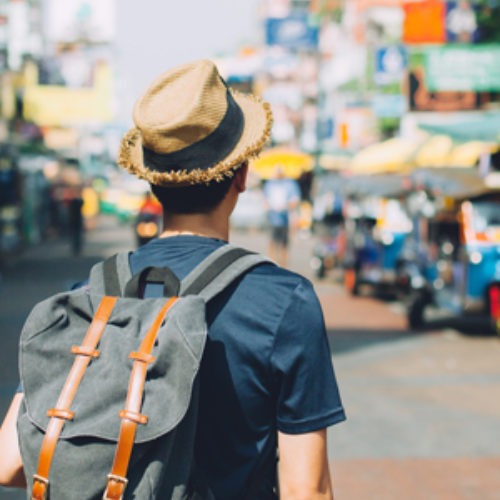
Barton Healthcare Staffing offers short- and long-term assignments for nurses and allied health clinicians that give you the opportunity to travel to different destinations, as near or as far as you want. While it can be easy to get caught up in the excitement of a new assignment and meeting new coworkers, it’s important to keep safety foremost in your mind when traveling. Implementing extra precautions can become second nature, and provide you with peace of mind while traveling solo.
Prepare With Prevention
Whether you’re traveling for your next assignment, or on your leisure time, put some thought into your packing. Be sure to let your friends and family know your itinerary, and when and how you’ll check in with them to keep them updated. Even if you’re only traveling an hour away from home, a little prevention can go a long way while making sure you make the most of your time while on assignment.
Keep Your Valuables Safe
It’s best not to bring valuables when you travel, but if you must, take photos of expensive items in case they’re lost or stolen. As you’re packing, consider how to keep your money, credit cards, and other important documents protected.
- Keep copies of documents in a safe, waterproof place, and considering storing copies of the information “in the cloud” such as in Google Docs or Dropbox folders.
- Hide cash and an extra credit card in separate, inconspicuous places in your luggage.
- Insulate from electronic pickpockets by using an RFID blocking wallet to help protect against identity and credit card theft.
- Tell your bank when and where you’re going, so you don’t get locked out of your account.
- Keep your wallet in your front pocket and make sure jacket pockets have zippers.
- If you’re using a backpack, purchase one that’s slash proof and keep it close.
- Consider a cross body purse, and don’t leave it hanging. They also make slash proof and RFID blocking purses!
- Be wary of public Wi-Fi and consider setting up a virtual private network (VPN) to access internet securely while traveling. For example, if you already have Norton for your personal computer, they also offer a secure VPN product for your mobile devices which can be bundled into your pre-existing security subscription.
- Plan to keep your laptop underneath the seat in front of you on the plane.
- Examine ATM readers for signs of tampering before using and avoid using it if someone is behind you.
Make Personal Safety a Priority
Traveling combined with onboarding to a new facility can be tiring, but it’s important to stay alert and maintain an awareness of your surroundings.
- Walk with confidence.
- Don’t draw attention to yourself as a traveler by studying maps, or not dressing appropriately for the area.
- Use a business card for your luggage tag, so your home address isn’t advertised.
- Make a list of local emergency numbers and information for your wallet, or on your phone for easy access in an emergency.
- Carry a whistle to startle a potential attacker.
- Keep your phone charged, and consider carrying a portable charger and battery pack.
- Be aware of potential tourist scams or cons.
Drive With Caution
It’s exciting to travel to a new destination, but there’s always the potential to get lost or face challenges while using unfamiliar rental cars.
- Make sure you know how to use your rental car’s headlights, hazard lights, and locks.
- Ask the rental agency what to do in case you break down.
- Plan your route ahead, so you can activate GPS voice instructions and minimize distractions.
- If you need to pull over, wait for a populated area.
- Park in well-lit areas away from large shrubs where a person could hide, or use valet parking if it’s available.
- Keep your personal belongings out of sight in the trunk of the vehicle.
- Practice caution if you’re using Uber or Lyft drivers by making sure you have the right car and driver, and not getting in if there are other unexpected passengers in the vehicle.
Plan for a Safe Stay
If you’re working as a clinician for Barton Healthcare Staffing, you have the benefit of the insight and knowledge of your BHS recruiter and access to our 24/7 travel support team.
- Schedule to arrive when it’s daylight to learn your way around the area
- Research your destination for safe modes of public transportation and if any areas in the city are dangerous
- If you’re traveling farther outside the continental United States, to one of our territories such as Puerto Rico or Guam, use the U.S. Bureau of Consular Affairs for information on potential health conditions, travel advisories and other resources.
- If staying in a hotel, request not to be placed on the ground floor and request a room with an interior entrance, near the elevators or concierge desk, but not close to the fire exit.
- Ask for two room keys to help hide that you’re traveling solo. Keep one on you, and one in your bag.
- Make sure your hotel room locks work, and for an added layer of security safeguard your door with a rubber door stop, or a portable door stopper alarm.
- Know your hotel’s security number, how to dial an outside line, and more than one method of exit in case of emergency.
- Leave the Do Not Disturb sign up even when you’re out or at work.
Make the Most of the Journey
No matter when or where you’re traveling, the most important thing is not to forget your common sense. Trust your intuition, don’t share personal information, and maintain an awareness of your surroundings and belongings at all times. This can help to ensure that you have a safe, enjoyable journey, and make the most of your assignment!

